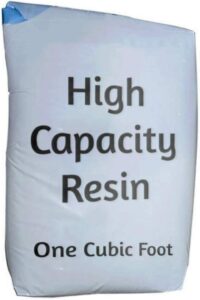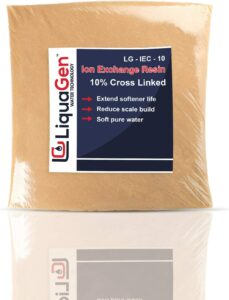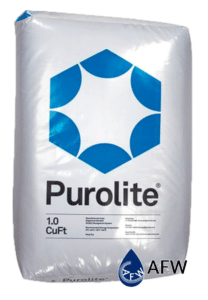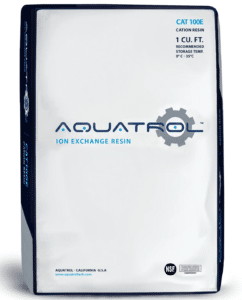Water softeners are exceptionally useful filtration systems for areas with high concentrations of hard minerals in the water. They use an ion exchange process to replace the hard mineral ions with sodium ions, softening the water through the tank.
However, the ion exchange capacities of the resin start to diminish as time goes by. So if you’ve had your device for 7 – 8 years, you might have noticed that the water isn’t filtered as effectively as it once was.
Luckily, there are several different resin brands that you may try to replace the old beads in your tank and renew the effectiveness of your system.
Based on our experience in the industry, we selected the top four resin brands for your water softener. Keep reading to find the perfect match for your water softener.

- Crosslink – 8%
- Quantity – 1.0 CuFt
- Price – $169

- Crosslink – 10%
- Quantity – 1.0 CuFt
- Price – $149.99

- Crosslink – 8%
- Quantity – 1.0 CuFt
- Price – $189
Best Resin for Water Softener
AFW Filters SOFRES1 High Capacity Resin – Best All-Rounder

- Crosslink – 8%
- Quantity – 1.0 CuFt
- Suitable for most types of water softeners
- Effective both at ion exchange and rust protection
- Lasts roughly 10 years
- Not very effective when used on very mineral-rich water
AFW Filters SOFRES1 is the best all-rounder because it does everything that a water softener resin is supposed to. The beads, contained within a 50-pound bag, have a volume of 1 CuFt.
It’s a high-quality product, so your softener will work as new with the SOFRES1 beads.
The AFW SOFRES1 is also compatible with almost all water softeners on the market, except for some models that specifically list a particular resin brand or type.
The product is protected against oxidation and rust, so it may also shield the inside walls of your tank.
All in all, if you use these beads in a standard water softener, you’re likely to be able to get around 10 years out of them.
On the other hand, if you use them on a water softener connected to a well system, or if you live in an area with extremely high hard water, the longevity of the resin may be reduced. The same applies if you use it in a commercial setting.
In conclusion, this resin is an excellent choice for household use in areas where the water has moderate to high concentrations of minerals. However, we recommend other resins for extreme hardness levels.
LiquaGen Water Softening Ion Exchange Resin – Best for Rust Prevention

- Crosslink – 10%
- Quantity – 1.0 CuFt
- Better oxidation resistance than most products
- Lasts around 10 – 15 years
- Comes with a funnel for easier bead replacement
- 10% resin beads are less effective at ion exchange
The LiquaGen has a 10% crosslink, meaning the beads are smaller than the ones used in 8% crosslink resin. While this sounds counterintuitive, the smaller 10% crosslink beads serve a vital purpose when it comes to oxidation.
The larger beads hold more moisture and are more prone to swelling. This makes them more vulnerable to chemicals like chlorine that accelerate the oxidation process and cause rust on the beads and the inside of the resin tank.
As a result, LiquaGen is the best option for homes with high levels of chlorine running through the pipes or houses in areas with a very high iron concentration in the water. The resin prevents damage to the inside walls and will soften your water for at least 10 years.
The funnel is a very small but beneficial quality-of-life improvement that these beads come with. The funnel will allow you to get the beads inside the tank without worrying about them spilling over the sides. While this is a very common item, surprisingly, few resin replacement brands include it in the purchase.
The one issue with this product is that it’s less effective with ion exchange than with AFW because of the 8% crosslink resins, which is the tradeoff for better rust protection.
It’s an excellent choice for some, but if you don’t have issues with iron or chlorine and just want effective beads, we recommend other options, like the all-rounder AWF Filters SOFRES1.
Purolite C-100E Cationic Resin Replacement – Best for Well Water

- Crosslink – 8%
- Quantity – 1.0 CuFt
- Great for water with both high iron and mineral levels
- Protects your tank from rust without reducing the effectiveness of the ion exchange process
- The expected lifetime is between 10 and 15 years
- The most expensive resin on our list
Purolite has a crosslink level of 8%, so it’s ideal for absorbing heavy minerals and exchanging them for sodium ions, but it’s not as good as LiquaGen when it comes to rust prevention.
That being said, Purolite is still a powerful acid cation softener, which successfully deals with large amounts of iron, outperforming all other resin beads on this list.
Well water is very rich in iron, calcium, and magnesium. The 8% crosslink resin level is usually better for calcium and magnesium, while 10% is better for water with a high iron concentration. The acidic nature of this resin makes it an excellent middle ground between the two.
Adding this product to your water softener will protect the inside walls of your tank from the high levels of iron usually found in well water. Additionally, this will boost the efficacy of the ion exchange process, allowing your softener to deal with hard minerals much better.
The Purolite lasts between 10 and 15 years, which is standard for most products. However, the lifetime will be reduced if you’re using these beads on well water or water that’s very high in heavy minerals.
While the product is a great all-rounder in almost every aspect, it’s also the most expensive item on our list. On the other hand, the $189 price tag may seem steep, but it’s still a good deal for a high-performance resin that lasts a decade.
Aquatrol CAT100E Ion Exchange Resin – Best Price

- Crosslink – 8%
- Quantity – 1.0 CuFt
- Very affordably priced
- FDA-approved
- Endures both cold and hot temperatures without getting damaged
- Not an ideal choice for areas that have high iron-content water
The Aquatrol CAT100E is, without a doubt, the best deal on our list. The LiquaGen Water Softening Ion Exchange Resin comes close in terms of price, but it’s still a bit more expensive.
Plus, the LiquaGen is geared towards iron protection, whereas the Aquatrol is a pure ion exchange-focused resin.
The product comes in a 50-pound bag, and like most other resins, there’s no funnel supplied, so you’ll need to get one yourself before you pour the bag’s contents into the tank.
Aquatrol is FDA-approved, guaranteeing the product produces water safe for human consumption. It’s also graded as high capacity, meaning the beads won’t warp or get damaged even when subjected to hot or cold temperatures.
Even the bag is well designed since it has an easy-pour spout that allows you to measure how many beads you need from the bag without cutting holes on the top or the sides.
The downside of this resin is one that it shares with most 8% crosslink products, namely that it’s not suitable for areas with a lot of iron or chlorine in the water. It’ll still be able to soften the water, but the high iron levels may cause rust to form inside the tank, and the resin will have its lifetime reduced by a few years as a result.
What Is Water Softener Resin
Water softener resin is the term for the beads inside the resin tank of a water softener. These beads soften the water that passes through the system and delivers non-mineral-rich water throughout your home.
How Does Water Softener Resin Work?
The beads are positively charged with sodium ions. Once hard water passes over the beads, heavy minerals like magnesium and calcium are attracted toward their surface. Then, they’re replaced with the sodium ions found on the surface of the beads.
The heavy minerals stay on the beads, and the sodium ions go into the water, summarizing the ion exchange process. Softened water then enters the home, while the heavy minerals remain on the beads until the regeneration cycle clears them.
Frequently Asked Questions
The following section addresses the most frequently asked questions about water softener resin and their performance.
The Aquatrol CAT100E Ion Exchange Resin is the most affordable resin we could find, and it’ll only cost you $140.
Water softener resin in 1.0 CuFt packaging costs around $140 to $190. Smaller packages cost significantly less.
If you’ve looked up water softener resin online, you’ve probably come across the term ‘crosslink.’
The crosslink percentage tells you how much divinylbenzene is in the beads. The higher the percentage, the smaller and less prone to swelling the beads are.
In simpler terms, crosslink describes how compact or how tight resin beads are. Resin beads with a lower crosslink percentage contain less moisture but more plastic, improving the water flow around them and increasing their ion exchange capabilities.
On the other hand, beads with a higher crosslink percentage are less efficient when softening but more resilient against oxidation and rust. So, there’s a tradeoff depending on your specific water needs.
Water softener resin usually comes with either an 8% or 10% crosslink rate. The 8% variant is better at the ion exchange process, while the 10% variant is better at rust prevention.
There are also 7% and 6% resin beads, but they’re too prone to rust to be a viable option for anyone who plans to use the same resin for over 5 years.
Installing water softener resin requires professional assistance. You’ll either need to get someone from the company where you bought the water softener to come down and change the resin, or you’ll need to hire a plumber who knows their way around this equipment.
Resin can be maintained with minimal effort if you add some cleaning agents to your system, but replacing it requires taking off the electronic brain, otherwise known as the head of the softener, located right on the top of the resin tank.
The water softener will first need to be disconnected from the pipes, and all brine tank connections will also need to be detached. Once that’s done, take off all of the removable connections that go to the top of the resin tank.
After everything is disconnected, carefully lift and remove the head from the resin tank to expose the top of the tank.
Once the top is off, tip the tank and pour the old resin into a disposable container or somewhere outside. When the tank is empty, add the new resin through the opening at the top.
Then, put the head back onto the tank, and connect the resin tank to the brine tank and the water pipes.
Remember that some resin brands state explicitly that they should be submerged in water for a brief period before you add them to the tank, so read and follow the instructions on the packaging carefully.
Additionally, remember that taking off the head of the water softener itself is very difficult, and you can easily damage or void your device’s warranty. We don’t recommend doing this on your own unless you’re absolutely sure you can handle it and have experience.
Conclusion
The AFW Filters SOFRES1 High Capacity Resin is the best option for most water softeners since it’s ideal for every type of water except for extremely mineral-rich water.
The LiquaGen Water Softening Ion Exchange Resin is the best option for water with high chlorine and iron concentration. It protects the inside walls of the tank from oxidation and rust damage.
The Purolite C-100E Cationic Resin Replacement balances efficiency and rust protection, so it’s the best choice for well-water systems.
The Aquatrol CAT100E Ion Exchange Resin is a great deal and a decent resin that can do everything you need.